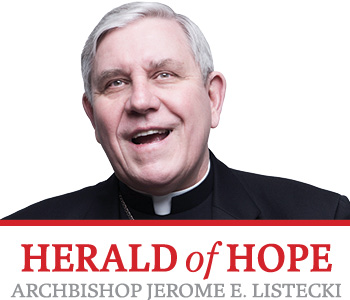I have encount ered a number of people who are apprehensive about the current state of affairs in our country. Some of these areas are the seeming divisions that have occurred in the realm of politics, the social reconstruction that is occurring under the guise of personal freedom and the international threat of nuclear proliferation endangering the entire human community. Many people of faith don’t know where and to whom to turn. They seek solace in the face of confusion. No one dialogues anymore; shouting matches have replaced civil discourse. Emotional arguments have replaced reason and logic. And, the old “ad hominem” statements have been injected into every debate.
ered a number of people who are apprehensive about the current state of affairs in our country. Some of these areas are the seeming divisions that have occurred in the realm of politics, the social reconstruction that is occurring under the guise of personal freedom and the international threat of nuclear proliferation endangering the entire human community. Many people of faith don’t know where and to whom to turn. They seek solace in the face of confusion. No one dialogues anymore; shouting matches have replaced civil discourse. Emotional arguments have replaced reason and logic. And, the old “ad hominem” statements have been injected into every debate.
It is little wonder that our Catholic communities are worried for themselves, their children and their Church. It seems to me in the climate of today’s arguments that the Catholic Church is often presented as the enemy to individuals who characterize themselves as “progressives.” Because of the rampant secularization that we are experiencing in today’s society, religion is no longer embraced as “good” for the development of the society, but at the present time tolerated, with just one step away from persecuted. Some may say that I am overreacting, but I believe that it is time that we were sensitive to the attacks so that we might prepare for our response.
It is true that the Catholic Church has certain positions. It’s shaped by the doctrine it espouses. We pray, “I believe in God, the Father Almighty, Creator of heaven and earth.” Think of what that means — our world is seen and unseen. We can never take for granted the spiritual activity that surrounds us. Our young people are fascinated by Harry Potter and the realm of magic. Yet, we have good spirits and bad spirits (angels and devils), a guardian angel that accompanies us through life and, of course, the saints.
The Church views human beings from a defined anthropological perspective. Human beings are composed of matter and spirit. Jesus Christ, the second person of the Blessed Trinity, became man. The great mystery of the Incarnation affirms the humanity that we possess and elevates our dignity as the Son of God who became one with us. As believers, we cannot deny the ultimate love expressed by the Father who willingly sacrificed His Son out of love for us.
I believe in the Holy Spirit. The Holy Spirit, the third person of the Blessed Trinity, animates the work of the Church. The Church is instituted to lead us to salvation and the Holy Spirit guides the Church in truth. Jesus said, “If you love me you will keep my commandments. And I will ask the Father and he will give you another Advocate to be with you always, the Spirit of truth, which the world cannot accept, because it neither sees nor knows it. But you know it, because it remains with you, and will be in you.” (John 14: 15-17) The promise of Jesus is fulfilled in the advocate, given to His Church. The Church is “indefectible.”
As we consider our position in this day and age, my advice is “hold the line.” Look to the teachings of the Church and understand that it is rooted in the truth that guides us toward our heavenly inheritance. We are not the only Christians to experience rejection and persecution, to be dismissed by authorities. In our 2,000 years of tradition, Christians have been thrown to the lions, burnt at the stake and dispossessed of all their property, merely because they were believers. “Blessed are you when they insult you and persecute you and utter every kind of evil against you (falsely) because of me. Rejoice and be glad for your reward will be great in heaven.” (Matthew 5:11-12).
What then is our task today? It is to be witnesses of “Blessed Boldness.” We need to stand tall in the face of those who would deny Christian truth. The leaders of Israel compromised with the prophets of Baal and turned away from the God of their fathers. This action caused their downfall. The solution was to return to the covenant and the promises they made as a people to God.
During the 26 years of St. John Paul II’s pontificate, he always told us to be not afraid. He lived in the face of oppression, Nazism, communism and growing secularism, and, despite the obstacles he faced, his hope was always manifest in the person of Jesus Christ. “The Church’s fundamental function in every age and particularly in ours is to direct man’s gaze, to point the awareness and experience of the whole of humanity toward the mystery of Christ, to help all men to be familiar with the profundity of the Redemption taking place in Christ Jesus.” (Redemptor Hominis #10.3)
So, live close to the Church and proclaim her teachings. With the Church, we “hold the line” despite the world’s problems and we will maintain our path towards sanctity by living a “Blessed Boldness” in a world that needs Jesus Christ.
